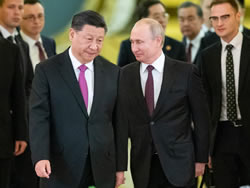Ian Parmeter* rejects an MP’s argument that the West’s China problems can be solved by bringing Russia in from the cold.
 Liberal MP and former diplomat, Dave Sharma suggests Australia and other Western States seek to contain China’s geopolitical ambitions by reaching out to Russia.
Liberal MP and former diplomat, Dave Sharma suggests Australia and other Western States seek to contain China’s geopolitical ambitions by reaching out to Russia.
He draws parallels between current United States political upheavals and those of the late 1960s and early 1970s.
Sharma writes that 50 years ago US President, Richard Nixon worked with National Security Advisor, Henry Kissinger to reach out to China.
The aim was to make it a third party in the superpower stand-off, forcing Moscow to divide its attention between two potential adversaries.
Sharma’s suggestion is to reverse Nixon’s trick — bring Russia in from the cold to balance China.
There are many problems with this proposal.
Sharma’s comparison with the Nixon-Kissinger foreign policy is flawed.
In 1969, China represented a huge opportunity waiting to be grasped by the US and the West more broadly.
The Cultural Revolution was over; the country’s de facto leader, Zhou Enlai, was emerging as someone other world leaders could work with.
Western businesses were salivating at the vast trade prospects starting to become apparent there.
So reaching out to China at that time had a rationale beyond Cold War security imperatives.
Kissinger, in his books Diplomacy and World Order, notes that Nixon saw the geopolitical potential of injecting China into the US-Soviet stand-off.
That did not mean making it an ally against Moscow, as Sharma suggests we could do with Russia vis-à-vis China now.
The Sino-Soviet ideological split from the 1950s had disrupted ties between them, and even produced armed border clashes in the late 1960s.
At the time of Kissinger’s 1971 visit to Beijing, the Soviets already had reason to watch their eastern flank.
Sharma does not mention that Nixon was also reaching out to the Soviet Union, as well as to China, from early in his presidency.
The Nixon-Kissinger policy towards Beijing was rapprochement and towards Moscow, détente.
Nixon’s bigger aim was to get the US out of Vietnam, and one of the major objectives of his China-Soviet outreach was to ensure they did not get in the way.
Probably the high point of Nixon’s détente strategy was in mid-1973, with Soviet leader Brezhnev’s visit to Washington.
It did not last much longer.
Its limitations became apparent later that year with serious tensions between Washington and Moscow over the 1973 Arab-Israeli war.
Though both superpowers co-chaired the Geneva peace conference immediately after the war, within a year the US had shut Moscow out of the process in favour of Kissinger’s shuttle diplomacy between Middle East capitals.
The US then managed by itself the Egyptian-Israeli negotiations that led to the 1978 Camp David Accords.
The souring of bilateral relations turned to acrimony after the Soviet invasion of Afghanistan in 1979, and nuclear war was only just averted when Moscow misread NATO military exercises in 1983 as the start of an actual attack on the Soviet Union.
Events since then have served to cement Moscow’s mistrust of the West in general, and the US in particular.
After the dissolution of the Soviet Union in 1991, Russians expected major US aid to rebuild their bankrupt economy.
Instead they got Chicago-school economists recommending radical privatisation measures that threw millions out of work and caused the rouble to plummet.
Despite what Russians claim were US promises not to expand NATO eastwards, by 2004 NATO’s membership included several former Warsaw Pact members and had reached Russia’s borders.
In this environment, President Vladimir Putin’s appeal to Russian nationalism has gained a ready hearing among Russians and is one of the reasons for his remarkably high polling figures over his 20 years in power — despite his manipulation of elections and the kleptocratic nature of his Government.
For Australia to urge other Western Governments to implement Sharma’s suggestion would require us to abandon principled policy positions in relation to Russia.
For Moscow even to consider alignment with the West, it would certainly demand that the West lift sanctions over Russia’s annexation of Crimea and cease the current legal process in The Hague over the 2014 destruction of MH17 that resulted in the deaths of 37 Australians.
Russia would obviously demand also that Australia desist from critical comments, such as Foreign Minister, Marise Payne’s accusing Moscow (as well as China) of disinformation campaigns.
Neither Australia, nor any other Western State could accept this.
Why should Putin even consider Sharma’s proposal?
When Putin’s predecessor, Boris Yeltsin, reached out to the West in the early 1990s, from the perspective of most Russians he got nothing in return.
Given that precedent, Putin appears content to base his foreign policy on countering US global strategy, undercutting US objectives when he disagrees with them.
A bonus for Putin is that Donald Trump is a gift that keeps on giving.
The US President has just suggested that Russia be invited back into the G7 group of rich nations even though Russia has done nothing to earn such a concession.
Moreover, Putin has a stable relationship with Xi Jinping that works for both in geo-economic as well as geopolitical terms.
Why should Putin exchange that for one with an unpredictable and apparently failing US?
*Ian Parmeter worked for 37 years in the Department of Foreign Affairs and Trade, the Department of the Prime Minister and Cabinet, and the Office of National Assessments. He is currently a Research Scholar at the Centre for Arab and Islamic Studies, Australian National University.
This article first appeared on the Australian Institute of International Affairs Weekly Outlook page.



